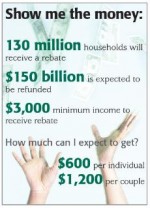Rebate has mixed effect on students

Tickets to island getaways and haute couture handbags are just some of the items students are planning to buy with a government rebate check meant to boost the economy.
More than 130 million households in America will receive an economic stimulus payment from the Treasury beginning in May. To qualify for the payment, taxpayers must have a valid Social Security number, $3,000 of income for 2007 and have filed a 2007 federal tax return.
Those eligible can expect to receive up to $600, and married couples stand to receive up to $1,200. Parents will receive $300 for each dependent child. College students who were claimed as a dependent on a parent is or someone else’s tax return will not qualify for the payment, even if they earned more than the required $3,000. Instead, their parents will receive $300.
Maureen Johnston, associate director in the Office of Financial Aid, said it is difficult to predict exactly how many students at the University are eligible for the rebate. She said not all students at the University apply for financial aid, but a strong majority does.
Assistant Director in the Office of Financial Aid Steve Runion said 25,939 students at the University applied for Financial Aid for the 2007-2008 school year. Of that group, 12,062 are dependents. Therefore, 12,062 students at the University are not likely to get the rebate.
Michael Loewy, associate professor in the Department of Economics, believes the tax rebate is a political maneuver aimed to garner support for the president.
“The reason it is being done mostly is politics, because it looks good politically. The political pressure kind of forces it, it makes for good politics,” he said.
Loewy is skeptical about the benefits of the rebate.
“The reality of it is that it won’t do much of anything, that’s what economic theory tells us,” he said.
Loewy said the government is counting on people spending the rebate checks, but he predicts people will put the money in the bank or use it to pay down debt. It will cause an increase in private sector saving, not an increase in spending, he said. Loewy based his prediction on a 2001 tax rebate given out by President Bush during a recession.
“It didn’t get spent, it got saved or got used to pay down debt,” Loewy said. “It kind of makes for good politics. It’s not particularly useful economics.”
Several students, however, plan to spend their rebates. Meghan Jordan, a junior majoring in biomedical sciences will spend hers on textbooks and/or tuition. Jennifer Soto, a junior majoring in biology will spend hers repairing her car. Summer Smith, a junior majoring in psychology and art history will also spend hers.
“I usually buy a purse with my tax return. With the rebate, I’ll probably just go shopping and buy accessories,” she said.
Chris Bemelmans, a junior majoring in environmental science, also plans to spend – not save – his rebate.
“If I get it, I already know what I’m spending it on,” he said. “Tickets to the Caymans.”
Some students, such as Cara Clayton – a junior majoring in political science – are claimed as a dependent but will receive the rebate from their parents.
“My parents will get it, but because the taxes were filed on my behalf, they’ll give (the rebate) to me. An understanding has been made between my parents and I,” she said.
Loewy said the tax rebate – which will cost the government $150 billion in revenue – will result in more borrowing on the part of the government which will lead to higher taxes in the long run.
“Because they borrow, they’ll have to pay it back later and they’ll do that through more taxes later. You’re just playing a timing game; you’re just rearranging when you’ll pay your taxes,” Loewy said.
The U.S. government borrows money from various entities.
“They borrow from whoever will lend it: individuals, banks, foreign governments, U.S. central banks. Every time the government borrows, it uses treasury bonds. The Chinese government has billions of billions of dollars in treasury bonds,” Loewy said.





